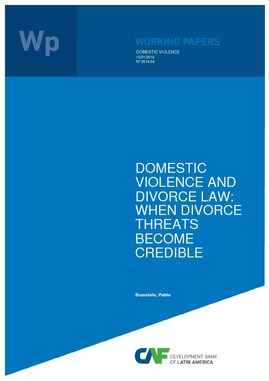Will you marry me, later? Age-of-marriage laws and child marriage in Mexico
Resumen
We provide empirical evidence on the impact of raising the minimum age of marriage to 18 years old on child marriage, early motherhood, and school enrollment in Mexico. Using a difference-in-differences model that takes advantage of the staggered adoption of this reform across states, we show that banning child marriage leads to a large and statistically significant reduction in the number of registered child marriages. However, we find no effect on school attendance or early fertility rates. We provide evidence that the mechanism behind these results is the substitution of formal marriage for informal unions. These findings suggest that when informal unions are a viable option for young couples, raising the minimum age of marriage is not enough to prevent early unions and their negative consequences.
Título paralelo
CAF - Working Paper #2020/09
Materia
Ciencia conductual | Cuidado infantil | Cultura | Desarrollo | Desarrollo social | Familia | Género | Mujer | Niñez
País / Región
Fecha
2020-11-03Citar de esta publicación
Item perteneciente a la Colección

Autor
Bellés-Obrero, CristinaLombardi, María
Items Relacionados
Motherhood, Pregnancy or Marriage Effects
The existence of large child penalties on women’s labor market outcomes has been documented for multiple countries and time periods. In this paper, we ...
Integrating Early-life Shocks and Human Capital Investments on Children´s Education
This study investigates how early-life conditions interact with subsequent human capital investments to influence future educational outcomes. To provide ...
Domestic Violence and Divorce Law: When Divorce Threats Become Credible
This paper investigates whether lowering the cost of divorce can reduce domestic violence. The cost of divorce influences the bargaining position of ...



